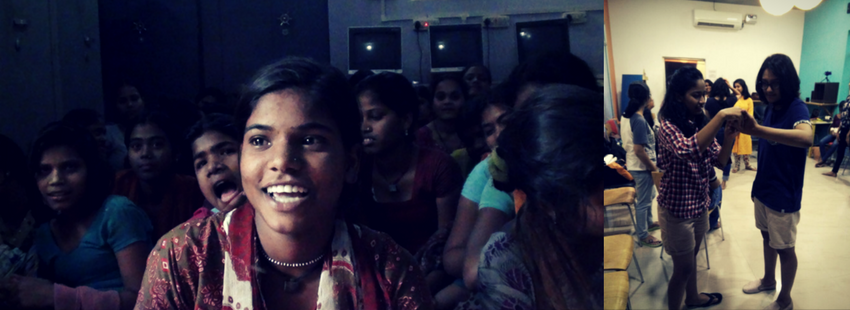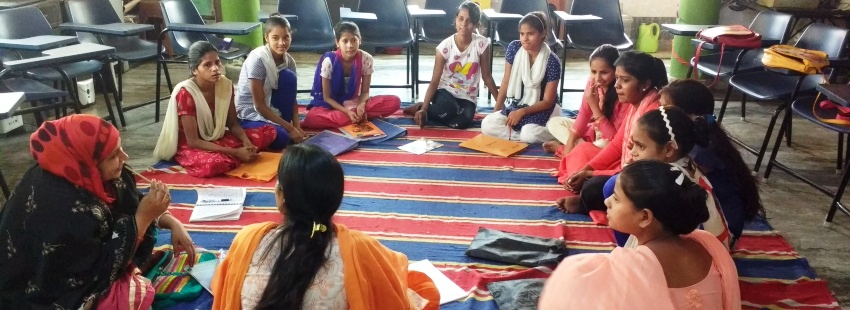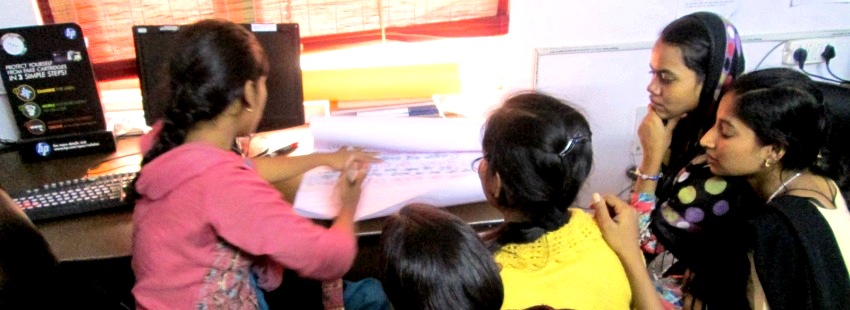Young People’s Education
In the current context of education, several community initiatives and governmental schemes are focusing on school-going children for the age group of 6 to 14 years. Right to Education Act 2009 also promises access to education among all children between this age group. However, a significant number of young girls and boys above the age of 14 years are not able to avail or continue their education. Access to education, especially among young girls living in resettlement colonies or unorganised colonies, has remained a challenge over the years. In addition, vocational trainings, life skills education and general health issues for young people are more emphasized in the current mainstream education programmes and structure.
Policies, schemes, and community-based work should recognise that young people, like any other social category, do not form a homogenous group and are located differently, whether in terms of gender, dis/ability, sexuality, caste, class, rural or urban, including young people who are transgender, a thus far invisible category.
Keeping such a dynamic yet unacknowledged context in mind, our work is aimed at how young people relate to the realms of school education, technology, gender, and sexuality. We seek to strengthen the process of school or non-formal education initiatives through teachers’ trainings, demonstrating possibilities of community involvement, research etc.
Nirantar started the work on education and capacity building with young girls in Delhi and Lucknow under two different projects. In Delhi, we are working with young girls of Delhi to provide literacy and numeracy skills from the perspective of gender and sexuality. Our Lucknow-based project was focused more on building information and communication skills of young Muslim girls.
Interventions
Literacy Programme for Young Girls in Delhi: After working with women from rural marginalised communities in Uttar Pradesh for years, we realised the need to understand the lives of young girls from the urban context. To address the emerging educational needs of young girls living in resettlement areas of Delhi, we started Parvaaz Adolescent Centre for Education (PACE) programme in April 2015. It is an educational programme with a gender and sexuality perspective, run in collaboration with community-based organisations of the selected areas, for adolescent girls and young adult women (age 15-22 years). These girls are either drop out, have never enrolled in the formal education system, or are school going but have low levels of literacy and numeracy skills.
The literacy centres are being established in areas where majority of the population settled is from marginalised and economically-backward groups like Muslim and Dalits. The Programme includes:
- Curricullum Building: Under this programme, we have developed a dynamic curriculum with a Feminist approach that could respond to the contextual realities of the girls. We have used our own existing resource materials, along with SCERT and NCERT textbooks of class 6th to 10th and resource material of other organisations to build the educational material. The curriculum has been divided subject wise, as well as thematically.
- Historical Walks: To make the curriculum interactive and participative, we collaborated with Darwesh, to conduct Historical walks around Delhi on the themes that co-related with our curriculum.
- Community Outreach: Weekly community outreach and two parent-teacher meetings have helped to establish trust with the parents of the learners, along with strengthening and broadening our work in the larger community as well.
- Documentation: Our documentation process has been a crucial element of our teaching-learning approach at the centres. While the day to day activities are being documented by the teachers, the girls are also encouraged to regularly express their thoughts and experiences through letter writing. This part of the programme helps to accumulate and analyse the myriad experiences of life in the urban space from the perspectives of these young girls.
Information and Communication Technology (ICT) for Empowerment: The mainstreaming of media – phones, computers, digital films, and videos – in towns and peri-rural areas has brought technology closer to the lives of young people and women. Nirantar sees empowering potential in new media, especially for young women from marginalized communities with limited formal education to challenge a social structure that restricts their lives to domesticity.
In November 2012, Nirantar, in collaboration with Sanatkada, launched its leadership program for young Muslim women in Lucknow. We undertook capacity building on the use of technology such as computers, photography and film-making, along with perspective building on gender and identity with young Muslim, Dalit, and tribal women.
Capacity Building: We provide capacity building inputs to groups and organisations working with young people, staff of community-based programmes, as well as for those involved in research, training, curriculum development, monitoring and evaluation. Our trainings seek to enable work with adolescence on sexuality, gender and life skills which is contextual, locating issues of sexuality in the lived realities of young people.
Advocacy: Our approach towards sexuality is positive and political, in which it seeks to build an in-depth understanding of ‘why’ sexual and gender norms and lived realities are the way they are and ‘why’ those who are seen to be challenging these norms are punished. We have also sought to generate an understanding and dialogue with governmental organisations and NGOs about the problems in which Life Skills and Adolescence Education is being approached.
Research on Conflict: Our literacy work with young girls in Delhi brought up questions around conflict, gender, sexuality and education. We are currently working with and researching on youth, both boys and girls, in Sanjay Camp (Dakshinpuri) to explore the inter-linkages between the conflict of the self and the structures of gender, sexuality, religion and class. The methodologies used are focused group discussions to conceptually talk about the themes of work, friendship, aspiration, love, family and education, and narrative analysis.



